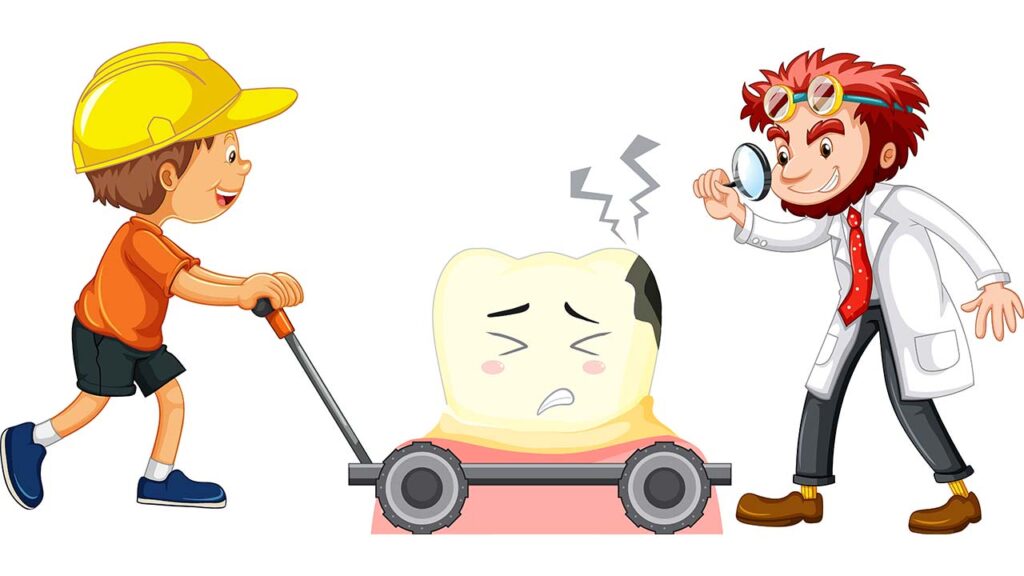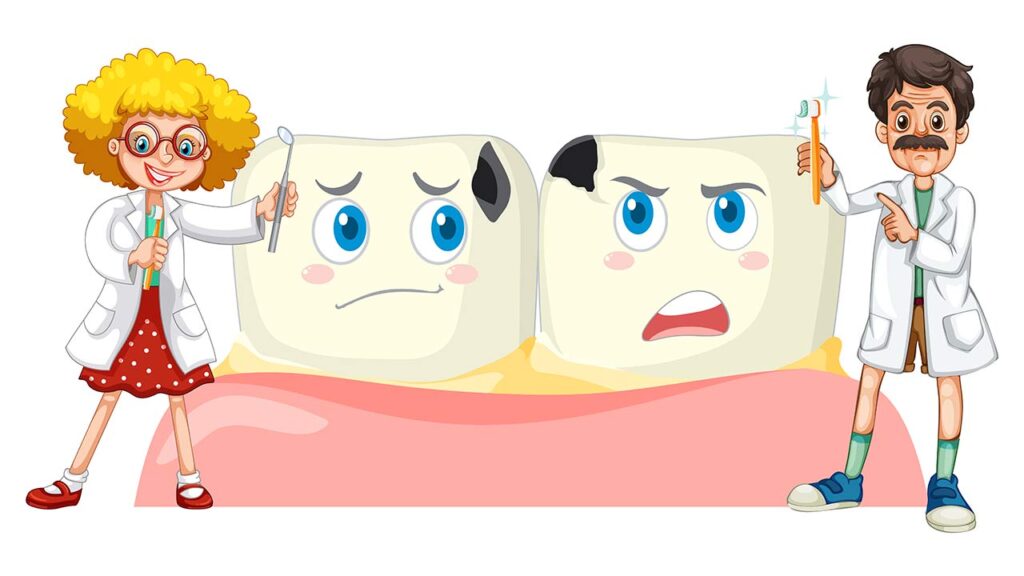Dental trauma refers to any injury to the mouth, teeth, gums, or jaw. It can occur due to a variety of reasons, such as falls, sports accidents, car accidents, and physical fights. The severity of dental trauma can vary, ranging from a simple toothache to the loss of a tooth.
This blog aims to educate individuals on the different types of dental trauma and the steps they can take to recover from them. The blog will cover the definition, causes, symptoms, and recovery process for each type of dental trauma. Additionally, a FAQ section will be included to address common questions and concerns.
Understanding Dental Trauma
A. Definition and Description of Dental Trauma
Dental trauma refers to any injury to the mouth, teeth, gums, or jaw. It can range from a simple toothache to the loss of a tooth and can be caused by a variety of reasons, such as falls, sports accidents, car accidents, and physical fights.
B. Causes of Dental Trauma

Dental trauma can be caused by a variety of reasons, such as falls, sports accidents, car accidents, and physical fights. Other factors that can increase the risk of dental trauma include not wearing a mouthguard during sports, neglecting oral hygiene, and having weak or brittle teeth.
C. Symptoms of Dental Trauma
The symptoms of dental trauma can vary depending on the type and severity of the injury. Some common symptoms include pain, swelling, bleeding, and difficulty biting or chewing. In more severe cases, an individual may experience a broken or knocked-out tooth, a loosened or displaced tooth, or jaw pain.
Types of Dental Trauma
A. Avulsed (Knocked-Out) Tooth
An avulsed tooth occurs when a tooth is completely knocked out of its socket. This type of dental trauma can be painful and can result in the loss of the tooth if not treated immediately.
B. Fractured Tooth
A fractured tooth occurs when a tooth is cracked or broken. The severity of the fracture can vary, ranging from a small chip to a complete break. This type of dental trauma can cause pain, sensitivity, and difficulty biting or chewing.
C. Dental Luxation (Displaced Tooth)
Dental luxation refers to a partially dislodged tooth that has been pushed out of its normal position. This type of dental trauma can cause pain, swelling, and difficulty biting or chewing.
D. Intrusive Injury (Tooth Pushed into the Jaw)
An intrusive injury occurs when a tooth is pushed into the jawbone, often as a result of a severe impact. This type of dental trauma can cause significant pain, swelling, and difficulty biting or chewing.
E. Subluxation (Partially Dislodged Tooth)
Subluxation refers to a partially dislodged tooth that has been moved from its normal position but is still attached to the surrounding tissue. This type of dental trauma can cause pain, swelling, and difficulty biting or chewing.
Also Read:
- The Different Types of Dental Trauma and How to Address Luxation
- The Different Types of Dental Trauma and How to Address Displacement
- The Different Types of Dental Trauma and How to Address Fractures
- The Different Types of Dental Trauma and How to Care for Your Teeth After an Injury
- The Different Types of Dental Trauma and How to Handle Discomfort
- The Different Types of Dental Trauma and How to Manage Pain
- The Different Types of Dental Trauma and How to Prevent Permanent Damage
- The Different Types of Dental Trauma and How to Care for Them
- The Different Types of Dental Trauma and How to Prevent Them
- The Different Types of Dental Trauma and How to Handle Them
Recovery from Dental Trauma
A. First Aid for Avulsed Tooth
The first aid for an avulsed tooth is to retrieve the tooth and rinse it gently with water. It is important to handle the tooth by the crown, not the root, to prevent further damage. The tooth should then be placed in a cup of milk or a special storage solution, and the individual should seek immediate dental care.
B. Treatment for Fractured Tooth
The treatment for a fractured tooth depends on the severity of the fracture. In mild cases, a filling or bonding may be used to repair the damage. In more severe cases, a crown, root canal, or extraction may be necessary. It is important to seek immediate dental care to prevent further damage to the tooth.
C. Recovery from Dental Luxation
The recovery from dental luxation depends on the severity of the injury. In mild cases, the tooth may be able to be repositioned and stabilized with orthodontic treatment. In more severe cases, a splint or surgery may be necessary. It is important to seek immediate dental care to prevent further damage to the tooth.
D. Recovery from Intrusive Injury
The recovery from an intrusive injury can be complex and may require multiple dental treatments, such as a root canal, splint, or surgery. It is important to seek immediate dental care to prevent further damage to the tooth and jawbone.
E. Recovery from Subluxation
The recovery from subluxation may involve repositioning the tooth and stabilizing it with orthodontic treatment or a splint. In more severe cases, surgery may be necessary. It is important to seek immediate dental care to prevent further damage to the tooth and surrounding tissue.
healthcareDental health is an important aspect of overall health and well-being. Take control of your dental health with our top-quality dental health care products. Say goodbye to painful and inconvenient dental issues and hello to a brighter, healthier smile.
These products are designed with the latest technology and are made from premium materials, ensuring that you get the best results. Whether you’re looking for a solution for sensitive teeth, gum health, or just want to keep your smile sparkling, our dental health care products have got you covered.
Tired of hiding your smile due to yellowing, stained, or sensitive teeth?
ProDentim is here to help. This advanced formula whitens and strengthens your teeth, while also reducing sensitivity and promoting oral health. Say goodbye to expensive and painful dental treatments, and start enjoying a bright, confident smile with ProDentim.
Click Here to Try ProDentim now and see the results for yourself!
Struggling with tooth sensitivity, gum problems or bad breath?
Dentitox Pro is the solution you need. This natural, effective formula helps to clean and strengthen your teeth and gums, giving you a brighter, healthier smile. Dentitox Pro is made with the finest ingredients and is free from harmful chemicals, making it safe and gentle for everyday use. Say goodbye to pain and embarrassment, and start enjoying a confident, beautiful smile with Dentitox Pro.
Click Here to Order now and get 20% off your first purchase!
Click Here for Professional Teeth Whitening
Frequently Asked Question (FAQ)
A. What is dental trauma?
Dental trauma refers to any injury to the mouth, teeth, gums, or jaw.
B. What are the different types of dental trauma?
The different types of dental trauma include avulsed tooth, fractured tooth, dental luxation, intrusive injury, and subluxation.
C. What is the first aid for avulsed tooth?
The first aid for an avulsed tooth is to retrieve the tooth, rinse it gently with water, place it in a cup of milk or special storage solution, and seek immediate dental care.
D. How can I recover from a fractured tooth?
The recovery from a fractured tooth depends on the severity of the fracture and may involve a filling, bonding, crown, root canal, or extraction. It is important to seek immediate dental care.
E. What is the recovery process for dental luxation?
The recovery process for dental luxation depends on the severity of the injury and may involve repositioning the tooth, stabilizing it with orthodontic treatment or a splint, or surgery. It is important to seek immediate dental care.
In this blog, we discussed the different types of dental trauma and the steps individuals can take to recover from them. Dental trauma can range from a simple toothache to the loss of a tooth and can be caused by a variety of reasons. It is important to seek immediate dental care to prevent further damage and ensure proper recovery.
To prevent dental trauma, it is important to wear a mouthguard during sports, maintain good oral hygiene, and seek regular dental check-ups. If dental trauma does occur, it is important to seek immediate dental care to ensure proper recovery.
Seeking immediate dental care is crucial for preventing further damage and ensuring proper recovery from dental trauma. Prompt treatment can also help to preserve the affected tooth and prevent complications such as infection or jawbone damage.

3 thoughts on “The Different Types of Dental Trauma and How to Recover from Them”